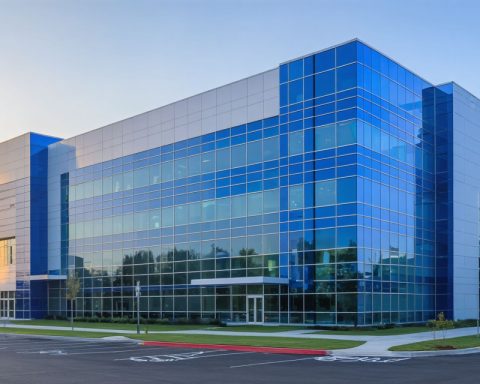The electric vehicle revolution is gaining momentum, and Lucid Group, a pioneering force with its futuristic Air sedan and anticipated Gravity SUV, is at the helm of this transformation. But while the EV sector surges forward, Lucid is confronting a storm of financial turbulence that could reshape investor expectations.
A Market on the Move
Electric vehicle markets worldwide are bustling with activity as global automakers rapidly transition to greener alternatives. Lucid’s advanced engineering positions it uniquely in this dynamic landscape. The company’s innovative approaches and groundbreaking product designs highlight its potential to thrive amidst rising consumer and regulatory demands for eco-friendly vehicles.
Financial Turmoil and the Road Ahead
Despite its innovative prowess, Lucid’s financial narrative is less optimistic—its stock has tumbled a staggering 96% over three years. With mounting losses reaching nearly $1 billion last quarter, coupled with a modest production increase, this decline presents significant challenges. Recent public stock offerings, though they injected $1.67 billion, have diluted shareholder value, raising flags for cautious investors.
Strategic Vision and Future Impact
Projecting stability, Lucid’s management claims to have secured adequate funding through 2026. Yet, the company’s elevated price-to-sales ratio remains a contentious issue compared to rivals like Rivian. Whether this high valuation can be justified depends on Lucid’s ability to scale production and reduce costs efficiently.
Investment Insights
For those entrenched in Lucid’s journey, long-term benefits may manifest if the company capitalizes on electrification trends effectively. However, potential investors should remain vigilant for financial indicators signaling improved stability before diving in. As Lucid maneuvers through financial trials, its strategic adaptability will be key to conquering the electric vehicle market’s future.
The Environmental and Economic Implications of the Electric Vehicle Revolution: Lucid Group’s Role
The ongoing surge in the electric vehicle (EV) sector, driven by companies like Lucid Group, represents a critical juncture for environmental sustainability, economic growth, and technological innovation. As the world increasingly pivots towards eco-friendly alternatives, the impact of this transition resonates across various dimensions of global society.
Environmental Impact
The electric vehicle revolution is primarily fueled by the dire need to reduce greenhouse gas emissions, a key contributor to climate change. Automobiles powered by internal combustion engines account for a substantial share of global carbon emissions. Transitioning to electric vehicles, which produce zero emissions during operation, significantly curtails this environmental burden. By advancing EV technology, Lucid Group contributes to cleaner air quality and a reduction in the carbon footprint, promising a more sustainable future for the planet.
Moreover, as more companies adopt electric technology, the demand for sustainable energy sources like wind, solar, and hydroelectric power is likely to increase, further reducing reliance on fossil fuels. This shift not only mitigates the impact of climate change but also helps conserve natural resources, preserving ecosystems for future generations.
Economic and Human Impact
While the environmental benefits are clear, the economic landscape is marked by both challenges and opportunities. Lucid Group’s financial struggles underscore the difficulty of navigating the nascent and highly competitive EV market. Despite initial setbacks, the EV revolution holds the potential to drive substantial economic growth. By fostering innovation and creating new jobs in engineering, manufacturing, and infrastructure development, the industry can stimulate economies worldwide.
Lucid’s strategic focus, including its commitment to cutting-edge design and performance, positions it to capitalize on increased demand from consumers and regulatory pressures favoring sustainable transportation. If successful, companies like Lucid will redefine the automotive industry, setting new standards for efficiency and design that could lead to broader market transformation.
Connections to the Future of Humanity
The evolution of the electric vehicle market, spearheaded by innovators like Lucid, is intricately linked to the future trajectory of humanity. As cities become increasingly crowded, the need for sustainable urban mobility solutions will grow. Electric vehicles play a pivotal role in this transformation, offering a cleaner, quieter, and more efficient means of transportation.
In tandem with advancements in autonomous driving and smart infrastructure, EVs promise to revolutionize urban living, making cities more livable and reducing traffic congestion. This evolution could lead to a decrease in reliance on personal vehicles, shifting towards shared mobility solutions and public transportation. Thus, electric vehicles not only herald an environmentally friendly future but also a new era of connectivity and collaborative consumption.
As Lucid Group navigates its financial turbulence, the broader implications of the electric vehicle revolution underscore a transformative period in human history—one where environmental responsibility, technological advancement, and economic resilience converge to sculpt a sustainable and prosperous future.
Lucid Group’s Bold Leap: Navigating Financial Challenges in the EV Revolution
Introduction
In the burgeoning world of electric vehicles (EVs), Lucid Group shines as a key player known for its cutting-edge engineering and distinctive designs. Yet, the company faces a tumultuous financial landscape that has investors closely watching its next moves.
The Changing Market Landscape
The global EV market is thriving, driven by a shift toward sustainable transport solutions. Countries worldwide are tightening their environmental regulations to curb emissions, compelling automakers to accelerate their transition to greener technologies. Lucid is positioned to leverage these changes with its high-performance vehicles, including the notable Air sedan and the anticipated Gravity SUV, which are designed to meet the evolving demands of environmentally conscious consumers.
Challenges in Financial Stability
Despite its promising automotive innovations, Lucid’s financial standing tells a different story. The company’s stock has experienced a dramatic drop of 96% in just three years, adding a layer of uncertainty for stakeholders. Recent financial reports indicate nearly $1 billion in losses in the past quarter, highlighting the acute nature of Lucid’s fiscal hurdles. While its recent public stock offerings raised $1.67 billion in funding, they also diluted existing shares, making potential investors wary about long-term financial health.
Strategic Insights and Comparisons
Lucid aims to stabilize its financial future, claiming to have secured sufficient funding through 2026. However, its heightened price-to-sales ratio remains a topic of debate, especially when compared with competitors like Rivian. The company’s ability to scale production efficiently and achieve cost reductions will be crucial in justifying this high valuation and securing its place in the competitive EV industry.
Pros and Cons of Investing in Lucid
Pros:
– Innovative Products: With models like the Lucid Air, the company offers high-performance, top-tier EVs attracting eco-conscious tech enthusiasts.
– Strategic Positioning: Lucid is positioned in a rapidly expanding market with increasing regulatory support for EV adoption.
Cons:
– Financial Instability: Significant losses and stock volatility pose risks to investors seeking stability.
– High Valuation Concerns: The elevated price-to-sales ratio compared to peers might deter potential investors looking for financial alignment.
Sustainability and Future Predictions
Lucid’s dedication to sustainability aligns with global efforts to combat climate change, positioning the brand advantageously for future market growth. Yet, the company must navigate financial uncertainties while remaining at the forefront of EV innovation. The coming years will test Lucid’s ability to adapt and thrive in an increasingly crowded and competitive market.
Conclusion
In summary, Lucid Group’s journey reflects the exciting yet challenging dynamics of the EV revolution. As the company addresses its financial struggles, potential investors and stakeholders should focus on its adaptability and strategic execution to capitalize on global electrification trends.
For more information, explore the Lucid Motors website.








